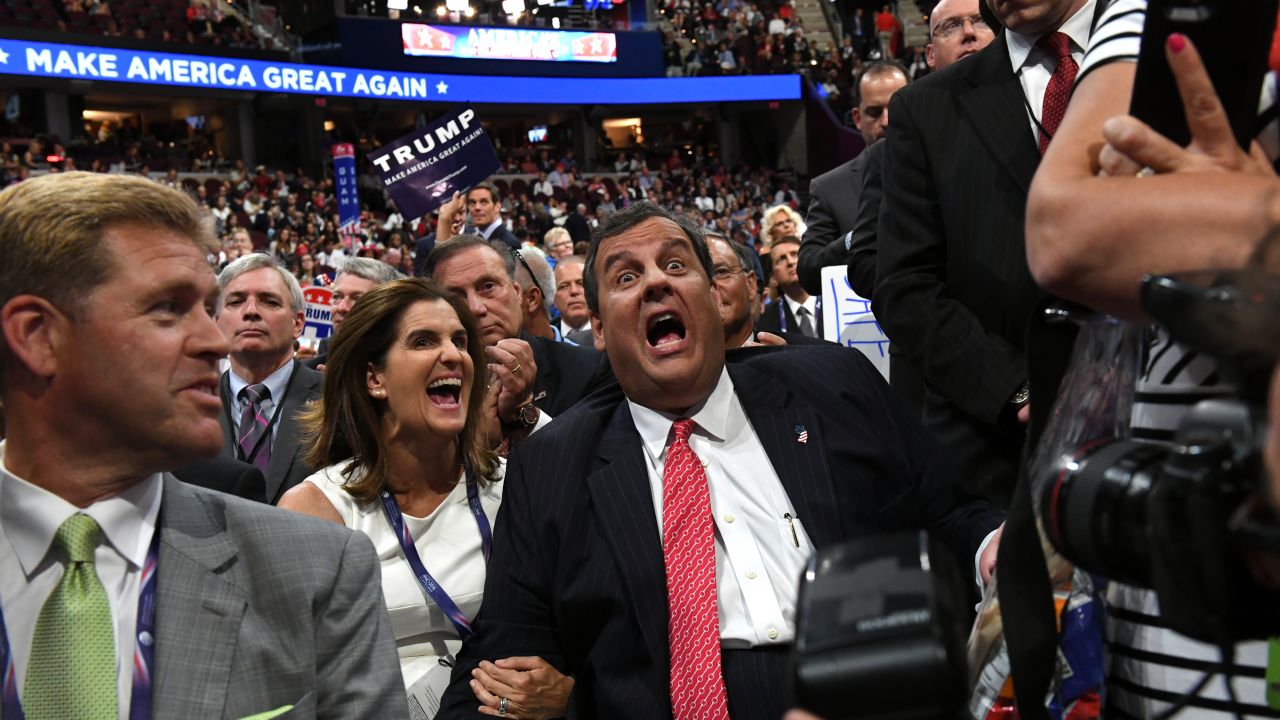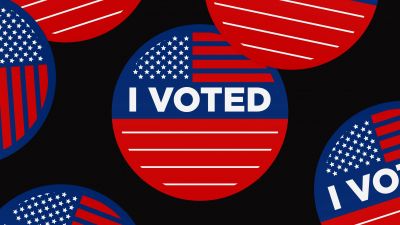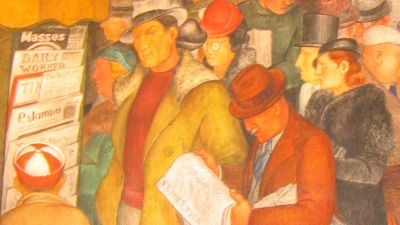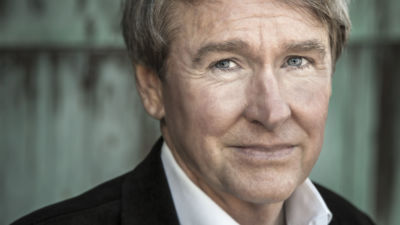
New Jersey Gov. Chris Christie and his wife, Mary Pat Christie, react during Donald Trump Jr's speech on the second day of the Republican National Convention on Tuesday, July 19, 2016. (Photo by Toni L. Sandys/The Washington Post via Getty Images)
How we got here –> We’ll begin with the always-excellent Charlie Pierce at Esquire and his reflections on the night Trump was formally awarded the GOP nomination:
The campaign was inevitable. The ground has been prepared for it for almost five decades. The ground was prepared when the Republican Party married itself to the flotsam of American apartheid. The ground was prepared when the Republican Party married itself to a politicized form of American Protestantism. The ground was prepared when the Republican Party allowed itself to get drunk on the fantasies and fabulisms of Ronald Reagan and discovered, mirabile dictu, that the country as a whole had a taste for the moonshine, too. “The ground was prepared when the Republican Party divorced itself from the proudest elements of its historical identity — the environmentalism of Teddy Roosevelt and Gifford Pinchot, the commitment to what once were quaintly called ‘internal improvements’ of Dwight Eisenhower, and most critically, the party’s dedication to some form of racial equality that was its founding purpose in the first place.
The ground was prepared when Richard Nixon was elected, twice. Sooner or later, someone was going to find the proper vehicle to run amok on the ground that was so prepared. Sooner or later, as Mary Shelley warned the world, the monster always breaks the chains.
Location, location, location –> In an ironic kind of way, Sean T. Posey wrote here at our website, Cleveland made perfect sense as the choice for the convention site. As a city that is less than half the size it was in 1950, its main industries moved overseas, victims of globalization. Neighborhoods changed rapidly as the city declined and whites fled en masse for the suburbs. Cleveland is representative of many of the problems facing the Rust Belt, and the region’s declining economy explains, in part, why working-class Democrats are defecting to Trump. At Politico Magazine, Keith O’Brian tells the story of Cambria County, Pennsylvania, a region reliant on steels and coal that once voted for Bill Clinton but which in November will choose Trump over Hillary Clinton.
The party united around hating Clinton more than liking Trump –> As Tara Golshan points out at Vox, many of the speakers barely mentioned Trump and instead focused on tearing down his Democratic opponent. “On the second night of the convention, the few Republican Party speakers who dared to show, including House Speaker Paul Ryan and New Jersey Gov. Chris Christie, mentioned Clinton almost four times more than they mentioned Trump in their speeches. Delegates on the convention floor were just as easily enthusiastic about chanting for Clinton’s imprisonment as they were cheering for Trump’s Mexican border wall, a staple of his political platform.”
And: That willingness to rally around a lust to see Clinton behind bars reminded Fareed Zakaria of elections outside the United States: “Over the years, I have watched campaigns in third world countries in which one candidate accuses the other of being a criminal, sometimes even threatening to jail his opponent once elected. But I cannot recall this happening in any Western democracy until this week. The Republican convention has been colorful and chaotic, but above all, it has been consumed by a vigilante rage, complete with mock prosecutors, show trials and chanting mobs. The picture presented to the world has been of America as a banana republic.”
Trump wants to be king; let somebody else be president. –> In May, an advisor to Ohio governor and erstwhile presidential candidate John Kasich told The New York Times‘ Robert Draper that Donald Trump Jr., approached Kasich’s team with an offer for their boss: “Did he have any interest in being the most powerful vice president in history? When Kasich’s adviser asked how this would be the case, Donald Jr. explained that his father’s vice president would be in charge of domestic and foreign policy. Then what, the adviser asked, would Trump be in charge of?
“‘Making America great again’ was the casual reply.”
Trump embraces the money –> He once called himself self-funded. No longer, reports Matea Gold for The Washington Post. Trump is now happy to accept help from super-PACs and the GOP money-collecting apparatus… and, apparently, foreign politicians. The investigative website WhoWhatWhy reports that Trump comtinues to ask for money from politicians overseas. “It is a serious violation of federal law to solicit political contributions from foreign nationals,” Larry Noble, the general counsel at the Campaign Legal Center, told The Hill. “There is no reason this should be happening… While US citizens do live abroad, they usually don’t have foreign government email addresses or are members of parliament, so they can’t try to explain this by saying they thought they were soliciting US citizens abroad.”
Ivanka Trump’s speech was one of the few that went well –> In a bid to expand Trump’s appeal — something the other speakers didn’t seem to try terribly hard to do — Ivanka Trump cast her father as an advocate for women in the workplace, and said that as president he would push for wage equality. Rebecca Traister at New York magazine: “This portion of Ivanka’s speech was beautifully delivered, cogent and mostly right on the money. It was also, with regard to her father, an enormous crock.”
Philip Bump writes at The Washington Post, “The only catch is that Donald Trump himself has never outlined those proposals, even roughly. The candidate who has is Hillary Clinton.” In fact, Trump, according to The Boston Globe, paid male campaign staff one-third more than female staff.
False narratives –> Ahead of the convention, the ghostwriter of Trump’s bestselling book, The Art of the Deal — which has served Trump well on the campaign trail and made millions — said he regretted his role in building the Trump’s image. “I knew I was selling out,” Tony Schwartz told The New Yorker’s Jane Meyer. “I put lipstick on a pig,” he said elsewhere in the article. “I feel a deep sense of remorse that I contributed to presenting Trump in a way that brought him wider attention and made him more appealing than he is… I genuinely believe that if Trump wins and gets the nuclear codes there is an excellent possibility it will lead to the end of civilization.”
Trump’s lawyers went after Schwartz as soon as the article appeared, demanding he send Trump a certified check for all of the royalties he has earned from the book, which he splits evenly with Trump.
Meanwhile, as Jeet Heer notes at The New Republic, the fact that Trump’s speech was full of non-truths (here it is annotated by Politifact, NPR) doesn’t mean it won’t work to pull in voters. Trump’s poll numbers have been improving, and continued to do so through the convention. Nate Silver writes at FiveThirtyEight that Clinton’s lead going into the convention was similar to what Obama had in 2008 and 2012, and what Kerry had in 2004. Her victory is far from assured.
About that acceptance speech –> Bill Moyers and Michael Winship write:
According to Republican presidential nominee Donald J. Trump, this land is rapidly becoming as bleak and dangerous as one of those twisted, vicious kingdoms in Game of Thrones, a place filled with violent crime and despair, a smoldering ruin overrun with foreigners out to take our jobs and terrorists bent on destroying our villages. It’s mourning in America. And only he can save us. This has been his message all year: I alone can fix it. Remember his tweet on Easter morning?
Another radical Islamic attack, this time in Pakistan, targeting Christian women & children. At least 67 dead,400 injured. I alone can solve
— Donald J. Trump (@realDonaldTrump) March 27, 2016
He alone has the potion. He alone can call out the incantation. He alone can cast out the demons. It’s a little bit Mussolini. A little bit Berlusconi. A little bit George Wallace. And a lot of Napoleon in a trucker’s hat. “I am not an ordinary man,” Bonaparte once said.” I am an extraordinary man and ordinary rules do not apply to me.”
But for some levity (sort of) –> …check out cartoonist Tom Tomorrow.



